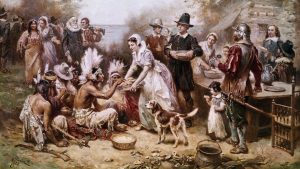
An Anglicized representation of the “first Thanksgiving” / Contributed Photo
Thanksgiving is one of the most beloved holidays in America. The celebration centers around gratitude, family, and of course, abundant feasting. But what is this holiday really about, and how does its dark history impact our lives today? Celebratory feasts during harvest season have existed long before European colonialists declared this national holiday. Autumnal festivals of bounty have existed all around the world for millennia. The Jewish Sukkot, the Celtic Lughnasadh, and the Japanese Tsukimi are just a few of the multitude of holidays that celebrate the passing of the seasons and the bounty preceding the coming winter season. Thanksgiving, a ubiquitous celebration in the United States, was declared a national holiday in 1863 by Abraham Lincoln. Despite this, the holiday came into being over 200 years prior.
The common belief about how this holiday came into existence is that the Pilgrims, after arriving in North America via the Mayflower, shared a meal with the Native Americans and, despite their differences, ate in peace and recounted their gratitude for the tribes that helped them have a successful first harvest in this unfamiliar land. Although some aspects of this story hold true, the vast majority of it is a myth, fabricated to hide the atrocities committed by the colonists against the indigenous peoples during this time period.
When the Mayflower landed in what is now Provincetown, they took over an abandoned village previously occupied by the Wampanoag tribe who had been driven out due to a deadly illness introduced by European colonists years prior. Months later, the pilgrims and the Wampanoag were able to create a peace treaty. The pilgrims never invited the Wampanoag to their harvest celebration. Instead, the Wampanoag heard their celebratory gunshots and were concerned that the pilgrims were breaking the treaty. As an apology, the pilgrims allowed them to join the festivities.
Overall, the changes in the story of Thanksgiving were minor, and would have seemed inconsequential if not for the following years of bloodshed and violent massacre. The Wampanoag people taught the colonists how to obtain a bountiful harvest and utilize the land, but as increasing numbers of Europeans began arriving in the area, the pilgrims disregarded this act of generosity and went on to initiate one of the deadliest and most horrific wars in American History: King Philip’s War. Colonists burned numerous native villages, killing thousands and nearly wiping out the Narragansett, Wampanoag, and many other tribes.
The horrendous history surrounding this holiday eliminates any question as to why, in recent years, this celebration has become more controversial than ever. While Thanksgiving can be a wonderful reminder of gratitude and a comforting way to connect with family and friends, it is necessary to recognize the genocidal past that it holds, and honor all those who lost their lives and culture at the hands of this tragedy.
